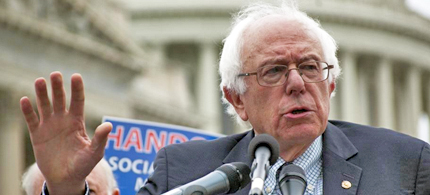
Sen. Bernie Sanders. (photo: Sanders.gov)
By Ted Glick

 f you had a President who said: ‘Nobody in America is going to make less than $12 or $14 an hour,’ what do you think that would do? If you had a President who said: ‘You know what, everybody in this country is going to get free primary health care within a year,’ what do you think that would do? If you had a President say, ‘Every kid in this country is going to go to college regardless of their income,’ what do you think that would do? If you had a President say, ‘I stand here today and guarantee you that we are not going to cut a nickel in Social Security; in fact we’re going to improve the Social Security program,’ what do you think that would do? If you had a president who said, ‘Global warming is the great planetary crisis of our time, I’m going to create millions of jobs as we transform our energy system. I know the oil companies don’t like it. I know the coal companies don’t like it. But that is what this planet needs: we’re going to lead the world in that direction. We’re going to transform the energy system across this planet – and create millions of jobs while we do that.’ If you had a President say that, what kind of excitement would you generate from young people all over this world?”
f you had a President who said: ‘Nobody in America is going to make less than $12 or $14 an hour,’ what do you think that would do? If you had a President who said: ‘You know what, everybody in this country is going to get free primary health care within a year,’ what do you think that would do? If you had a President say, ‘Every kid in this country is going to go to college regardless of their income,’ what do you think that would do? If you had a President say, ‘I stand here today and guarantee you that we are not going to cut a nickel in Social Security; in fact we’re going to improve the Social Security program,’ what do you think that would do? If you had a president who said, ‘Global warming is the great planetary crisis of our time, I’m going to create millions of jobs as we transform our energy system. I know the oil companies don’t like it. I know the coal companies don’t like it. But that is what this planet needs: we’re going to lead the world in that direction. We’re going to transform the energy system across this planet – and create millions of jobs while we do that.’ If you had a President say that, what kind of excitement would you generate from young people all over this world?”
~ Bernie Sanders, from the November 2013 issue of The Progressive
I support a Bernie Sanders campaign for president. I support it whether he decides to run as an Independent or within the Democratic primaries. I support it no matter what criticism he receives from more radical leftists for particular positions he has taken. I support it because I’ve believed for months that Bernie Sanders is easily the one person who, by running for president in 2016, can do the most to excite and inspire tens of millions of people in this country, give the kind of leadership needed to generate an independent and progressive, multi-issue mass movement for systemic change.
And it looks like a real possibility! For the last few weeks articles have begun to come out indicating that he is taking this idea seriously. In an interview with Politico just a few days ago, he said, “[The] major issues of this country that impact millions of people cannot continue to be swept under the rug. And if nobody else is talking about it [running for president], well, then maybe I have to do it.”
My first direct contact with Bernie Sanders was about 30 years ago when he spoke at a fundraiser I helped to organize for the National Committee for Independent Political Action. At the time he was the mayor of Vermont’s largest town, Burlington, elected on a third party line and as an open Socialist. Soon afterwards he was elected to Congress, where he has been ever since either as a House member or a senator.
In that role he has been a consistent voice for low-income people, working class people, the middle class, and our threatened ecosystem. Earlier this year he co-sponsored with Senator Barbara Boxer a major piece of climate legislation, a “fee-and-dividend” bill described as a “gold standard” type of bill by The Nation magazine.
In comments made by Boxer at the press conference announcing the introduction of this bill, she referred to Bernie as a straight shooter, someone who didn’t play political games. I remember thinking at the time that for Boxer, immersed as she has been for so long at the highest levels of a pretty corrupt two-party system, that was high praise indeed. It was as if Bernie had been an inspiration to her.
This strength of Sanders as an outspoken champion of the oppressed and beaten down, at the same time that he has shown his ability to navigate and have some impact even on Capitol Hill without being corrupted, is an additional reason why he really is the progressive left’s best option for 2016.
Is the fact that he is an open Socialist a potential political problem? Well, there’s no question but that this will be used by Fox News and the right-wing smear machine to try to discredit him, but the fact that he has been elected as an open Socialist to the House and then the U.S. Senate is going to make it hard, it seems to me, for those attacks to stick, with the exception of the usual 25-30% of the electorate that is ideologically on the far right. And Sanders has plenty of experience in dealing with this kind of stuff.
And how many of us are aware of a poll released by the Pew Research Center at the end of 2011 which found that 31% of the American people say they have a positive view of the word, “socialism,” with 49% of young people ages 18-29 having a positive view? It’s hard to believe that those numbers wouldn’t go up when there is a campaign led by popular US senator Bernie Sanders that articulates what a socialist approach to the major issues is all about.
Should Bernie run as an independent or in the Democratic primaries? As someone who has been a member of and sometimes leader in efforts to form a progressive third party since 1975 to the present day, I’m open-minded on this question. It is a fact that, as things now stand, Sanders’ running as an Independent would mean he had no chance of winning and could, instead, make it more likely that Chris Christie, Jeb Bush or – God forbid – Ted Cruz were elected president. Sanders has said that he is not interested in that kind of campaign.
But the presidential election is three years away. A lot can happen in three years.
I would say that the key question as to how Sanders should run is what will bring together a critical mass of the constituencies that must unite if we are to have a chance of winning against the corporate rulers’ hard (Republican) and soft (centrist Democrat) candidates. If significant sectors of labor, community-based, and people of color groups, the women’s and LGBT movements, immigrant rights and farmer/rural groups, climate and environmental groups, small businesses and others are willing to support an Independent candidacy, that could well be the best route to take. Remember, Abraham Lincoln was elected with a plurality of votes, 36%, because there were four substantive presidential candidates in 1860. A three- or four-party race seems unlikely right now for 2016, but the political situation is very fluid, with severe divisions within the Republican Party that could see a Tea Party third party effort, and we need to remain open to all possibilities.
Finally, and very important, is the issue of a Sanders campaign being run in such a way that it creates a Democratic organizational network that continues past 2016.
Some of us who had experience with this critical, strategic question back in the 1980s, when Jesse Jackson decided to run for president in 1984, are still alive and still active politically. A number of us who were supportive of Jackson, as well as Jackson himself back then, felt strongly enough about this that by 1986 a National Rainbow Coalition was formed. By 1988 this effort was growing in organizational strength. State Rainbow conventions were being held in various parts of the country, with the electoral success of Jackson’s 1988 Democratic primary campaign fueling this development. And Bernie was connected to this. His campaign manager for the 1988 Bernie Sanders campaign for Congress was also a leader of the Vermont Rainbow Coalition.
If Sanders runs for president, it is critical that something like that ’86-’88 Rainbow Coalition phenomenon be created alongside a Sanders electoral operation. Bernie needs to support it and help to lead it, but it also needs its own collective leadership not totally dependent upon Sanders or any one person. It needs to be a 21st century version of that late ’80s Rainbow, with more participatory democracy, internet and social-media savvy, a combination of from-the-top and bottom-up leadership, all about popular education and leadership development, etc.
As important as Bernie Sanders is right now, as much as he is the right person to lead us at this point in time, history teaches us that movements dependent upon one individual, even someone with credentials like Bernie’s, are like houses built on sand: they may last for a while, but they will eventually be swept away.
It’s time, it’s way past time. Our suffering peoples and destabilized and polluted ecosystem are in desperate need of leadership in the national electoral arena that can truly bring about change we can believe in. Bernie Sanders is the guy. Run, Bernie, run!!
Ted Glick has been a progressive activist, organizer and writer since 1968. Past writing and other information can be found at http://tedglick.com, and he can be followed on twitter at http://twitter.com/jtglick.












![AEO, Ras Kass, Nkechi Taifa, Kymrence Young & Tricky Trev.) (feat. Young RJ [Slum Village], Ras Kass, Nkechi Taifa & Kymrence Young)](https://ibw21.org/wp-content/uploads/2024/12/organizing-anthem-AEO-Agitate-Educate-Organize-1600x900-1-100x100.jpg)


